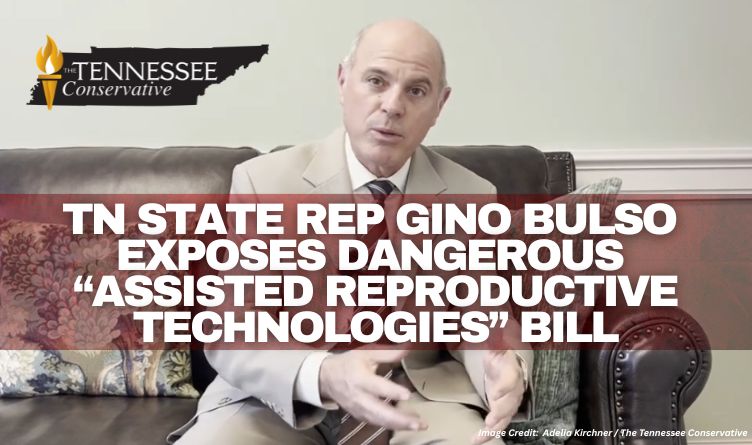Image Credit: Adelia Kirchner / The Tennessee Conservative
The Tennessee Conservative [By Olivia Lupia] –
Representative Gino Bulso (R-Brentwood-District 61) is proposing a significant amendment to HB0533, which seeks to enact the “Fertility Treatment and Contraceptive Protection Act”.
The Act is a seemingly benign bill which would secure the “right” to seek assisted fertility treatments in the state but could instead lay the grounds to severely undermine pro-life law in Tennessee.

The Act creates a broad “right” to assisted reproductive technology, including in artificial insemination/in vitro fertilization, genetic testing of embryos, and the long-term preservation or destruction of unwanted human embryos, despite there being no prohibitions or regulations on such technology in current Tennessee law. It could also potentially allow abortion-inducing drugs to be considered “contraceptives”.
Sponsored by Republicans Rep. Iris Rudder (Winchester-District 39) and Sen. Becky Massey (Knoxville-District 6), the legislation has already unanimously cleared the full Senate 29-0 and is headed to the full House for a vote on Wednesday, April 9.
In an interview with The Tennessee Conservative, Representative Bulso elaborated on the motives of the bill, what his amendment (HA0312) seeks to remedy, and why this bill on its own should be considered dangerous by those who value the lives of unborn children in Tennessee.

Q: What do you believe the bill sponsors are trying to accomplish with this legislation as there are currently no prohibitions or restrictions on fertility treatments or reproductive technologies in Tennessee?
Bulso: Well, it certainly seems that what they’re trying to accomplish is to codify unlimited and unrestricted right to engage is what is defined as fertility treatment, which is defined very broadly and includes any treatment that relates to fertility. There is nothing in our code that restricts or regulates any type of fertility treatment, and they are likely just trying to get something on the books that protects against any future legislation to restrict it or regulate it.
Q: What is your goal with the amendment and why did you choose the language you did?
Bulso: The whole logic is to prevent the killing of unborn children. And the place to start is the statute that we’ve got that defines ‘unborn child’ [which] I referenced in the amendment, and it’s a very good definition, it’s just beautiful. It says ‘unborn child’ means, ‘a child from fertilization until birth’. And that’s good policy because that’s the way nature is, at the time of fertilization you’ve got the entire genetic makeup of a new, unique human being. You’ve got all 46 chromosomes, you’ve got everything to determine the sex of the child, the eye color, hair color, all those sorts of things.
My amendment does three things. One, just states as fact that there are no laws in Tennessee against fertility treatment. Number two, it defines ‘contraceptive’ as excluding an abortion-inducing drug, which is another term defined in our code. And then third, and probably most critically, it reaffirms the state has a compelling interest in the protection of the life of an unborn child and that life begins at fertilization and an unborn child is a child from fertilization through birth. Because, without this, the concern is that if you were to give up the notion that we should protect an unborn child from fertilization through birth, you now are weakening the whole concept of our laws against abortion.
And when you look at some of these, what they call ‘assisted reproductive technologies’, of which invitro fertilization is one, three things happen when you create an embryo in a petri dish. You have the embryo implanted into the mother’s fallopian tubes so that it can grow just the way a normally conceived embryo would, [two] it’s destroyed, or three, it’s frozen. And so, two out of those three things are not good and one of the things that this bill talks about is that there’s no restriction ever, and there’s a right to genetic testing.
And when you look at the most recent statistics that are available, it appears that there are 7% of all artificially created embryos that result in a live birth. But 93% of the embryos created are either destroyed or they’re indefinitely frozen. And when you look at the way we properly define ‘unborn child’, this is a problem. These two things are in conflict.
If you say you can destroy an unborn child in the embryonic stage, then you’ve effectively given up any scientific or biological argument against abortion, because if you can kill a child at the embryonic stage, then why not at two weeks, or two months, or six months? You’re killing the same thing, it’s just a question of growth and development. And so that’s why I thought it was important to file the amendment. And I don’t know that it’s going to be successful when we get to the amendment on the House floor on Wednesday, but it’s something that I was compelled to do because I’m someone who understands that life begins at conception, and there’s no way to equivocate about that.
Q: What can citizens say when contacting their representatives before the House vote on Wednesday?
Bulso: Encourage their representative to support the amendment because it reaffirms Tennessee’s commitment to protecting the life of every unborn child and it does not change existing practice one iota. Nobody can complain about it. I think if people read just how beautiful our definition of ‘unborn child’ is and how scientifically accurate it is, I think they can appreciate why this bill is such a danger, because it says that an individual has an unlimited, unregulated right to create and destroy human embryos. That’s what this bill does, and that’s completely inconsistent with our policy regarding what an unborn child is.
To contact your Representative with your thoughts on this bill and Rep. Bulso’s amendment before Wednesday’s House floor session, you can use this tool: Find My Legislator


Olivia Lupia is a political refugee from Colorado who now calls Tennessee home. A proud follower of Christ, she views all political happenings through a Biblical lens and aims to utilize her knowledge and experience to educate and equip others. Olivia is an outspoken conservative who has run for local office, managed campaigns, and been highly involved with state & local GOPs, state legislatures, and other grassroots organizations and movements. Olivia can be reached at olivia@tennesseeconservativenews.com.



One Response
You undermine your credibility when you try to turn your religious views into law. Bulso’s religion is well known.
Do a little research. 70% of voters are in favor of abortions in cases of Rape or Incest.
Since 1975 there have been 30 million abortions and 90% were to unwed poor young girls on welfare. Those kids would have grown up to be Dems and the Dems would have total control. We wouldn’t have Freedom of Speech and Kamala Harris would be president.
I’ll oppose anyone who proposes a law that bans abortions for rape or incest. To force a raped girl to have the rapist’s baby would be EVIL!!!
What’s next? Banning birth control? (birth control prevents conception). A law to protect “sperm”? Sperm is alive – look at it under a magnifying glass.
You’re helping the Dems. I’ve voted for Bulso and donated, but no more – he’s an extremist who’s trying to turn his religious views into law.
If the Repubs become extremists they will lose votes. I’m old and remember the arguments. Roe was a compromise. Overturning Roe is why we lost in 2022. Look at the harm it caused America because we lost in 2022.
Look in the Bible and Jesus’ teachings – no mention of abortion.
The Talmud permits abortion under certain circumstances and requires it if the woman’s life is at stake. The New Testament was a second chance for God to make himself clear about abortion. Jesus had some strong views of marriage and sex – he considered the Jewish divorce laws too lenient and disapproved of stoning adulteresses. But he said nothing about abortion. Neither did Saint Paul, or the other New Testament authors.